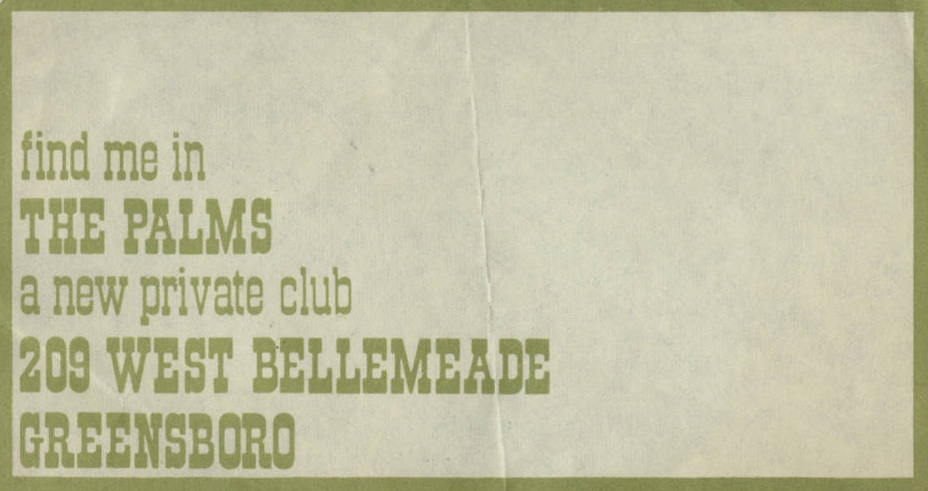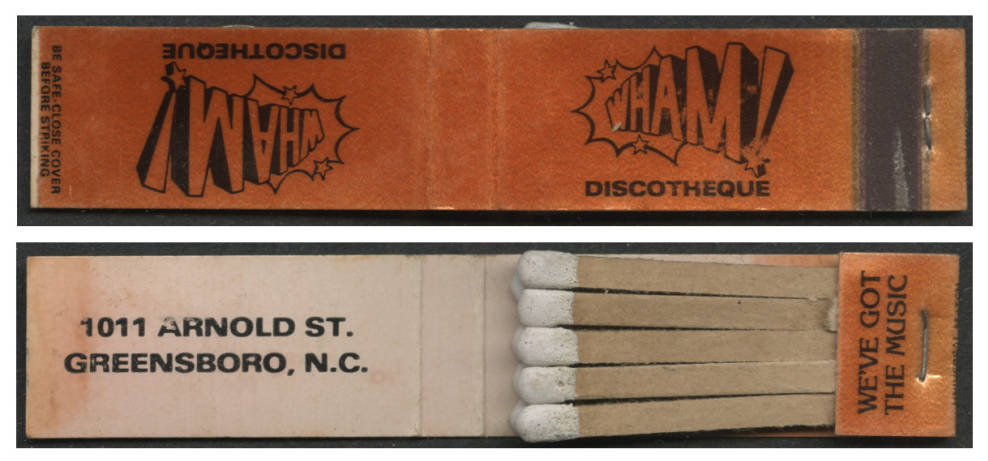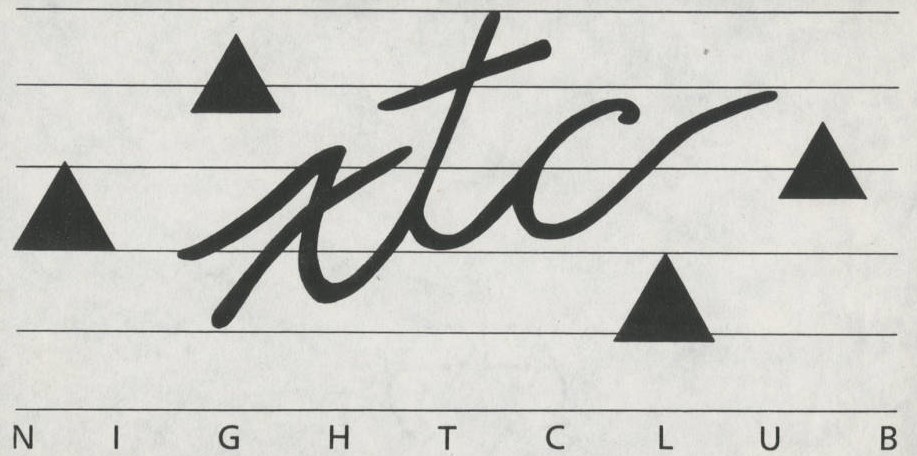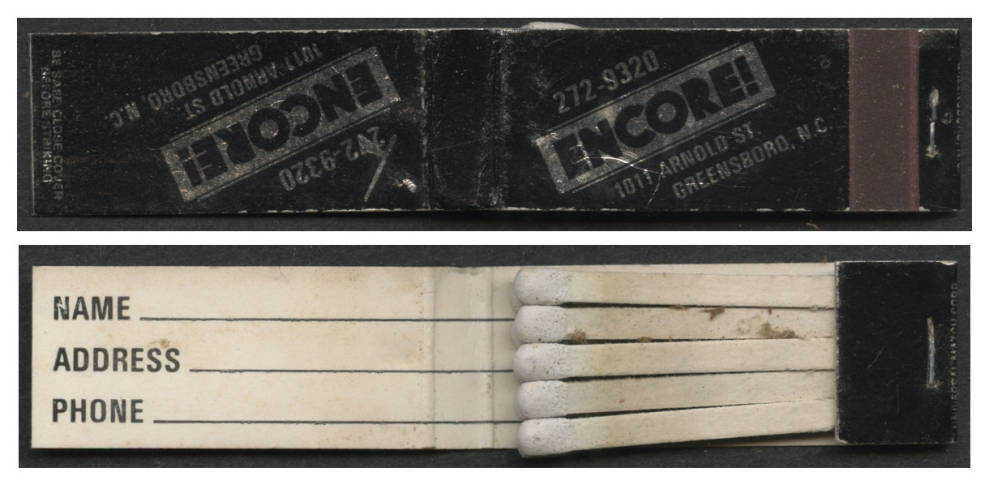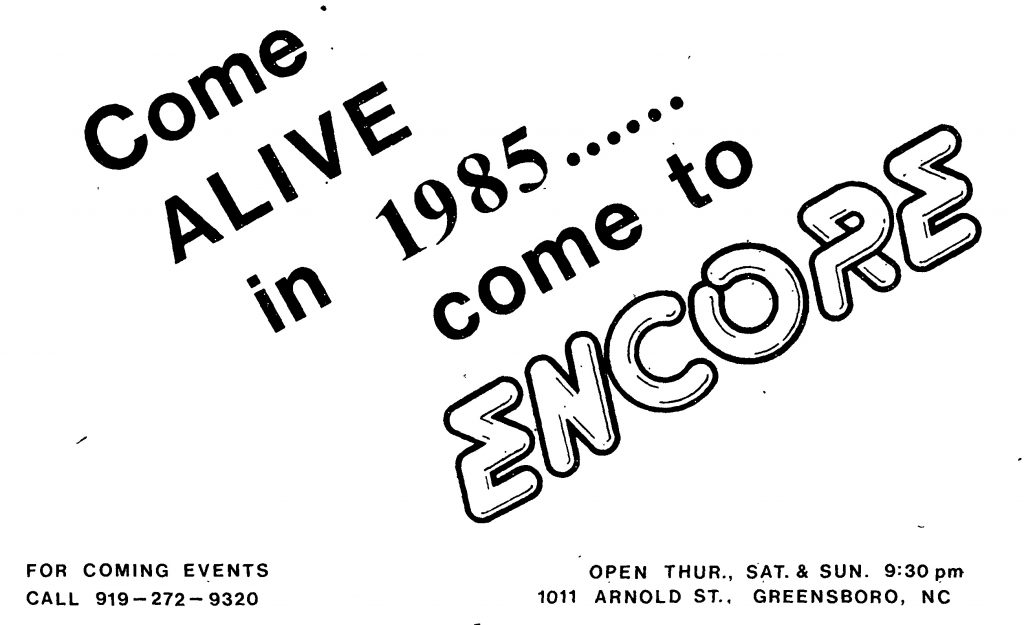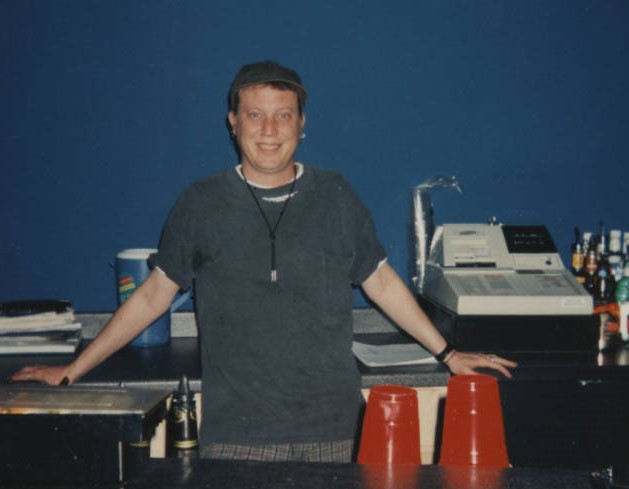LGBTQ+ Nightlife of Greensboro, North Carolina in the 1980s and 1990s
By Jackson Mc Cutcheon
Over the last half century or so, gay bars and clubs have played a pivotal role for the social hemisphere of the LGBTQ+ community. These establishments provided an environment that allowed this community to both discover, explore and flourish their own sexual-orientations as well as meet similar other people and create connections to like-minded social circles. Since World War II until the eve of social media, a night out with friends (or alone) was all but the only near constant place of refuge for those that identified as gay or queer. One should put an emphasis on ‘near constant’, because while progression was exponentially sky-rocketed by the era of The New Deal during the 1930s and 1940s in more metropolitan and urban areas, there was a dark fluctuation during the height of Cold War during the Lavender Scare, even these scenes were under surveillance and oppression. “It is a well-known fact that several restaurants, clubs, and other establishments get most of their support from these sexual perverts,” Congressman Arthur L. Miller stated. He pondered further, “How many secrets of the Government are spilled,” because, according to him, “perverts and bottle clubs are tolerated in the District of Columbia?” [1] After the riots at Stonewall in 1969, the 1970s and 1980s saw a steep climb in both social normality and popularity of gay nightlife as the cornerstone and number one place of social occupancy in the LGBT subculture. [2]
The need for such refuge and social connection is important in any climate, as seen in the above examples of Washington, D.C., and Denver (CO), but it is undeniable that such essentiality is considerably amplified in the more historically conservative areas of the United States – namely the in the southeast, or the “Bible belt”. Even with the progression of the 1970s and 1980s, Greensboro (N.C.) and other major North Carolinian cities had a need for social sanctuary as much as any demographic. Police stings in Greensboro at a rest area (1983), a mall in Raleigh (1985), and a park in Charlotte as late as 1987. [3]
With the preceding context now entrenched, the purpose of this article is to document and briefly describe the gay bars and clubs of Greensboro (N.C.) and others within reasonable to the extent of those that have sufficient documentation or recorded and transcribed information from the Pride! Of the Community oral history project. [4] Most of these bars are described as being ‘one-size fits all’, due to the fact that few co-exist simultaneously in Greensboro – the number of bars necessary for more specialization or demographic specification was never present. [5]
Map by David Gwynn, Sources: Bob Damron Guides, , Q-Notes, Polk City Directories.
Davey’s Bar
Davey’s was a smaller club and bar and could be found on 723 Kenilworth Street on the UNCG campus (site of the current UNCG Human Resources office). Jeff Rainey, an interviewee in the Pride! Of the Community project, had his first experience with LGBT nightlife at Davey’s in 1977 as an 18-year-old and describes his first encounter as follows: “Walking in, the guy at the door scared me to death. He was my first flaming queen that I’d ever seen in my life. You know, got up in there and it was all leather daddies. It was a shock, the very first walking in.” Rainey continues, “. . . it was a dive kind of place, but my favorite thing about it was that it had a sunken-in dance floor, it was like, I don’t know — I don’t know what it was before Davey’s, and what could have made that, but their dance floor, it was very small, you walked down into it, so therefore there was a railing [leading down].” [6]
The Palms
The Palms, originally located at 209 West Bellemeade Street in Greensboro, relocated in the early 1980s to 413 N Eugene Street, part of the current site of First National Bank Field, located downtown. The Palms is described as having a “neighborhood-clientele.” [7] Originally a jukebox joint, it was open seven days a week. The Palms also had a sizeable lesbian demographic, especially compared to other LGBTQ+ establishments in Greensboro. The Palms was owned and operated by “Joyce the Bartender,” and was open seven days a week as a “jukebox joint.” Compared to the other gay bars in Greensboro, the Palms had a moderately older crowd, and was considered the most “laid-back,” or at minimum, the least “intense” of the bars. The Palms operated from 1980 until 2004.
Wham!
Located on 1011 Arnold Street in Greensboro where Boston’s House of Jazz now is, Wham! was a livelier scene than the Palms or Davey’s. Featuring a light-up dance floor and a focus on disco music, it attracted a younger and more outgoing crowd. Rainey describes it as attracting the more “glamorous” members of the gay community in Greensboro. Wham! was mostly a gay male scene; females who frequented Wham! were mostly the straight friends of the former.
Busby’s
Originally located at 2507 High Point Rd (now West Gate City Boulevard), and then on Bellemeade Street near the current First National Bank Field in downtown Greensboro, Busby’s was the “grungiest” of the bars, considered a “dive bar” by numerous interviewees for the Pride! Of the Community project. Seats were few, and most attendees had to sit on empty beer cases. Owned and operated by the titular Randall Busby, the bar’s location at 330 Bellemeade Street, adjacent to a local “gay cruising” area, lasted from 1986 until 1990. The space was subsequently occupied by Time Out, another LGBTQ+ bar, but is no longer standing.
X.T.C.
Located at 2519 High Point Rd (now West Gate City Boulevard), XTC was owned and operated by Liz Hamilton, who previously worked as a bartender at Wham! and Encore. Drag shows in other gay bars tended to be held on the weekends, especially in the Triad area. XTC pioneered a Tuesday night drag show, and the idea met with tremendous success. XTC also had large crowds on Friday nights. The Palms later adopted this model as well. XTC operated from 1986 until 1990.
Encore
The successor to Wham!, Encore was located in the same building at 1011 Arnold Street in Greensboro from 1982 to 1991. Encore was open as late as practically any bar in the state; alcohol sales, by law, had to cease at 2 AM. At that time, underage club-goers could attend until Encore closed at 4 AM. Before Wham! or Encore, the building was the site of The Castaways, a beach-music club.
Others
Several bars in Greensboro during the 1980s and 1990s were not categorically “gay bars,” but were nevertheless welcomed all sexual orientations, and often attracted a sizeable LGBTQ+ crowd. Notable bars and clubs included Babylon, The Edge, and even New York Pizza.
Babylon was founded by Ed Bronson, a local DJ, and Don Black. [8] Babylon was arguably the most popular club in Greensboro during the early 1990s and attracted tremendous amounts of people with its signature “First Friday” raves. Babylon opened around 1993 and shut down in 2000 after the tragic murder of Ed LeBrun, another DJ associated with the club, brought public scrutiny to the unlawful practices (mostly substance abuse, including by underaged teenagers) inside Babylon resulting in the seizure of the club’s alcohol license. [9] Babylon also is one of few LGBTQ+ bars in Greensboro with surviving video footage, which can be viewed on YouTube here and here.
Notes
[1] Karl M. Bowman and Bernice Engle, “A Psychiatric Evaluation of the Laws of Homosexuality”. American Journal of Psychiatry 112, no. 6 (February 1956): 577– 83; “A Noted Psychiatrist Asks Why So Much Hysteria?” Mattachine Review, July– August, 1955, 14–15. [Retrieved from David K. Johnson’s The Lavender Scare].
[2] Thomas Jacob Noel, “Gay Bars and the Emergence of the Denver Homosexual Community”. The Social Science Journal no. 15 (1978); Martin Bauml Duberman, Martha Vicinus, and George Chauncey, Jr. Hidden from History: Reclaiming the Gay and Lesbian Past. (Markham, Ontario: New American Library, 1989), 427.
[3] The Front Page. 1985. “Raleigh Police Tactics Denounced in Court”. 5 February 1983: 3.
Ibid., “…Greensboro Too”. 20 May 1986: 11.
Ibid., “AP Covers Alamance Bust”. 6 December 1988: 2.
[All three retrieved from David Gwynn’s Urbanization and Social Change in the Gay South: The Experience in North and South Carolina (1971-1991), 1991]
[4] https://library.uncg.edu/dp/pride/
[5] Interview with David Gwynn, Digital Projects Coordinator and Associate Professor at the University of North Carolina at Greensboro.
[6] Jeff Rainey Interview – https://youtu.be/ykY3numZ1fI
[9] Marty Schladen, “Club Surrenders Liquor License”. Greensboro News & Record. April 14, 2000. Access date: 6/21/2019.


